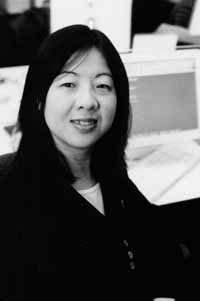2003 Carnegie Scholars Announced: Professor Xiadong Lin is one of 13
On May 7, the Carnegie Corporation of New York named 13 new Carnegie Scholars, including emerging and recognized scholars at American universities and research institutions. Xiadong Lin, who is Associate Professor of Technology and Education at TC, was among them.
Lin was named a Carnegie Scholar for her work on "Images of Good Students and Good Classrooms: Enhancing Teacher Awareness of Their Own and Student Cultural Beliefs."
An award-winning scholar on education and technology, Lin has become well known for her work on how technology can best foster understanding and communication among teachers and students from different class, race and cultural backgrounds. Her current research focuses on systemic studies about what it takes for people from different cultures to understand and appreciate one another's values and products, and how technology can be designed to support such cultural appreciation.
Based on established research showing that teachers and students are often not aware of how their own beliefs affect their approaches to learning and teaching, Lin will use her fellowship to study how students and teachers from various cultural backgrounds interact in classrooms in the U.S. and how deeper knowledge of those similarities and differences can lead to improved classroom practices.
She will develop a computer program that will help teachers self-assess their own beliefs about learning, unpack their cultural link to such beliefs and use students' beliefs as the basis for instructional practice.
The Corporation names up to 20 Carnegie Scholars annually, with each award lasting up to two years and providing a maximum of $100,000 in total funding. At the end of each fellowship, Carnegie Scholars submit written reports to the Corporation, which may then assist in disseminating those results.
This year, 144 nominations were received and 48 were invited to provide complete project descriptions. Committees including Carnegie Corporation program leaders and external advisors evaluated the finalists. Thirteen finalists were then presented to Carnegie Corporation's Board of Trustees.
"Criteria for selection were based on stringent academic standards as well as the relevance of the project to Corporation program priorities," says Neil Grabois, vice president and director for strategic planning and program coordination at Carnegie Corporation of New York.
Andrew Carnegie created the Carnegie Corporation of New York in 1911 to promote "the advancement and diffusion of knowledge and understanding." As a grant-making foundation, the Corporation seeks to carry out Carnegie's vision of philanthropy, which he said should aim "to do real and permanent good in the world."
Published Tuesday, Jun. 17, 2003
